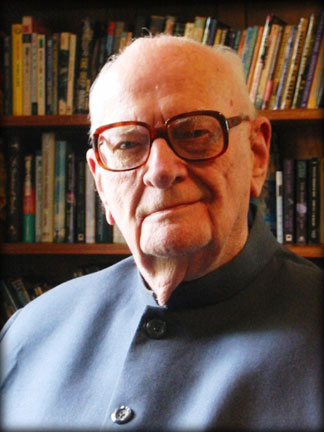|
Sir Arthur C.Clarke:
A visionary of our times
By Kalakeerthi Edwin Ariyadasa
“Whatever that be
within us that feels, thinks, desires and animates, is something
celestial, divine and consequently, imperishable.”
- Aristotle (384 – 322
BC)
Greek philosopher.
 |
|
Sir. Arthur C. Clarke |
In most instances, the immortality of a given individual needs ages
to get firmly established. But Arthur C. Clarke, is a phenomenal
exception to this ‘Immortality rule.’
From the time the first functional communications satellite was
lifted 21,300 miles up into the sky in 1965, as dictated by the formula
he outlined in 1945 in the paper titled “Extra-terrestrial relays”,
Arthur C. Clarke earned a strange kind of immortality.
Of the seven billion people inhabiting the planet earth today, there
is hardly anyone – whatever the age – who is not touched by the far –
reaching communications revolution, Arthur C. Clarke's concept brought
about.
The person who sends or receives an international telephone call, is
utilising a social benefit endowed upon man by Arthur C. Clarke.
An international news item, that you come upon in your newspaper,
would have been transmitted via satellite.
‘Live’ presentations are galore in television fare and in sound
broadcasting.
The Facebook relationships that exceed seven billion are built on
messages exchanged through communications satellite.
The internet, which is almost a universal source of instant
information, derives its being, from Arthur C's, communications wisdom.
Applications of his original communications concept are numerous. You
have i-pods, i-pads, i-phones of a vast variety of brands.
Mobile phones and related communications instruments occur in an
extensive variety of formats.
As things are, his central concept has enabled the birth of an
e-world, which has brought into it the whole range of human professions,
disciplines and interests. This revolution has begun to elbow out the
traditional modes of personal and intimate human communications.
By shrinking the human community into a ‘global family’, he made the
‘global village’ obsolete.
When the ramifications of his communications revolution continue to
spread further afield, there is the strongest likelihood of the
emergence of a “global individual”, capable of being in touch with the
massive world outside, unceasingly. The future proliferations from the
central concept presented by Sir Arthur are beyond one's imagination.
The outcome of all this is, that Arthur C. Clarke's wisdom is embedded
in the mass-mind of the global population. Even the so-called ordinary
men and women too are affected day and night by the global
communications transformations be authored.
If an individual is ensconced in the psyche of the global community,
and also if this is going to continue into the far future, isn't that
individual immortal by any definitions we may apply?
Since, he has become part of the routine life-styles of almost all
human beings, Arthur C. Clarke's immortality can quite justifiably be
described as “ordinary immortality.”
Had he lived – this, ‘ordinary immortal’ - would be 96 years on
December 16. He passed away at the age of 90. This “immortal sage” spent
more than half of his lifespan in Sri Lanka.
But what should irk many a thoughtful Sri Lankan today is that, when
a universal immortal of this stature lived among us for so long, we were
not able to derive the benefits of his presence.
We may perhaps have to realise, with deep pangs of regret and sorrow
that we may have failed both as a nation and as Individuals.
Sir. Arthur C. Clarke entertained immense hopes for a marvellous
future for man. Words he spoke way back in 1999 uphold this view quite
effectively.
This is what he said: “a future of infinite promise lies ahead. We
may yet have a splendid and inspiring role to play on a stage wider and
more marvellous than ever dreamed of by any poet or dramatist of the
past.
For it may be that the old astrologers had the truth exactly
reversed, when they believed that the stars controlled the destinies of
men. The time may come when men control the destinies of stars.”
These words are not empty, baseless effusions of an irresponsible
person given to hyperbole.
On the other hand, those golden words emerge from an immortal, who
was keenly focused upon the joint future destiny of the totality of the
human community.
We have to adequately heed these profound prophetic pronouncements
and to form our attitudes to reap the best from those possibilities,
that had come within the vision of this immortal, who resided among as.
Generally (nor always, of course), we in this country tend to neglect
our human treasures, when they are around and alive and lament loudly
when they are gone.
When we made the 96th birthday of this immortal we had with us, let
us resolve, as least, to produce an authoritative work about Arthur C.
Clarke's days, in Sri Lanka.
I am sure, state sponsorship would be forthcoming for such a noble,
national project.
|

